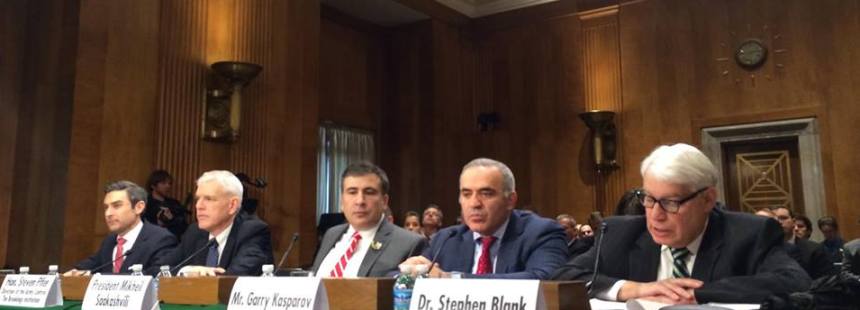

Senate Subcommittee on Europe and Regional Security Cooperation
“Russian Aggression in Eastern Europe: Where Does
Putin Go Next After Ukraine, Georgia, and Moldova?”
Wednesday, March 4, 2015
Garry Kasparov – Chairman, Human Rights Foundation
My thanks to the Subcommittee and to Senator Johnson for inviting me here today. It has been a very difficult last few days, mourning the brutal murder of my friend and colleague Boris Nemtsov in front of the Kremlin last Friday night, while also wanting to honor his memory and his fight by pressing the case for ending the regime of Vladimir Putin in Russia. I have learned from painful experience that these first days after an atrocity are very important, because people outside of Russia quickly forget and move on.
Boris was an outspoken critic of a police state that has no tolerance for critics. His imposing presence regularly embarrassed an increasingly totalitarian dictatorship that could not permit even the smallest amount of truth to leak out. His latest report was to be on the presence of Russian troops in Ukraine, fighting Putin’s war against a fragile democratic state in Europe. Boris also actively promoted the Magnitsky Act, a piece of rare bipartisan 2012 legislation that brought sanctions against Russian officials for another brutal murder, that of anti-corruption attorney Sergei Magnitsky in 2009.
Boris Nemtsov was killed because he could be killed. Putin and his elites believe that after 15 years of power there is nothing they cannot do, no line they cannot cross. Their sense of impunity, combined with the atmosphere of hatred and violence Putin’s propaganda has created in Russia, is a lethal combination.
Boris was not the first victim of this deadly mix. Georgia, Ukraine, and the stability of the modern world order is also under attack. Putin must justify his grip on power somehow. With his oil and gas-based economy failing, he is following the path of so many dictators before him: propaganda, division, and war. Enemies are needed so that Putin may protect Russians from them. Ukraine was always a tempting target, and recent leaks have shown that an invasion plan existed even before the fall of Putin’s puppet, Viktor Yanukovych. Inside Russia, independent journalists and opposition activists are portrayed as dangerous national traitors, in language lifted directly from the Nazis.
Of course I feel deeply the loss of my friend Boris Nemtsov and the persecution of others who dare to speak against Putin. But Ukraine and what it illustrates about Putin and his regime that are more consequent to today’s hearing. Since Putin took power in 2000, one Western administration after another declined to confront him on human rights at home or over his increasing belligerence abroad. The timeline of Russian repression circulated here today does an excellent job of listing many of the worst moments of Putin’s crackdown. But there could also be a parallel timeline of all the meetings, deals, and smiling photo-ops the leaders of the free world took with Putin while these atrocities were taking place. The Western engagement policy that should have been abandoned as soon as Putin showed his true colors over a decade ago was continued at every turn, which emboldened Putin and delegitimized our opposition movement.
Putin rebuilt a police state in Russia in full view of the outside world and now he is confident enough of his power to attempt to export that police state abroad. To Georgia, to Ukraine, to Moldova. Where next? He is testing NATO now and he will test it further. Putin also provides a role model for the rest of the world’s dictators and thugs by proudly defying the superior forces of the free world. From Iran to Syria to Venezuela, Putin’s Russia provides both material support and what I would call “amoral support”.
Putin is not going away on his own. Ukraine is only his latest target. Ukraine must be defended, supported, and armed now. It may seem far away to you, but it is the front line of a war the United States and the rest of the free world is fighting whether it admits it or not. Sanctions are important, but it was obvious six months ago they were not enough to deter Putin, and he must be deterred.
Stop treating Putin like any other leader who can be negotiated with in good faith. Stop legitimizing his brutal regime at the expense of the Russian people. The opposition movement Boris and I believed in and that Boris died for should also be openly supported, the way the West championed the Soviet dissidents. Let the people of Russia know that they have allies abroad, the way Ronald Reagan told those of us behind the Iron Curtain that he knew it was our leaders, not us, who were his enemies. Contrary to the widely circulated official polls, Putin does not enjoy broad public support in Russia. If you are truly popular you can allow a free media and free elections – and your critics are not gunned down in the street.
Putin’s oligarch supporters must be forced to choose between giving him up and a doomed isolation. They cannot be allowed to continue to live like Trump and rule like Stalin. The people of Russia want to be free, but defeating a globalized and energy-rich dictatorship that has the tacit support of the free world is too much to ask. You cannot negotiate with cancer. Like a cancer, Putin and his elites must be cut out. He must be isolated and removed, for only when Putin is gone can Russia be the free, strong, and independent country Boris Nemtsov always dreamed it could be. Thank you.
FULL REPORT AND TESTIMONIES OF OTHER WITNESSES

